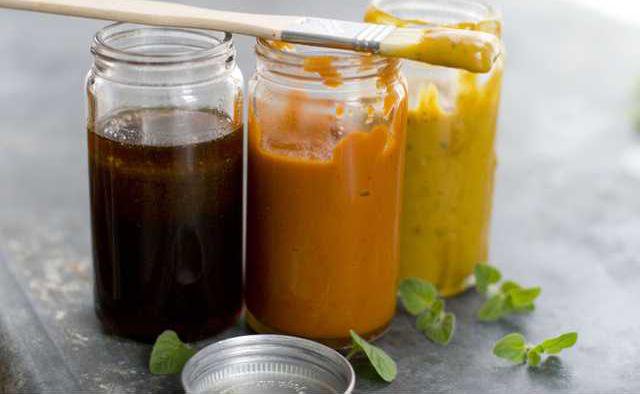When it comes to barbecue sauce, these days there’s something on the market to satisfy even the most discriminating tastebuds. From thin and vinegary to thick and sweet — or somewhere in the middle — there’s a sauce for everyone. "That’s one thing that I really like about Sonny’s (Bar-B-Q restaurant). They have a good variety of sauces," said Tammy Ware, an Oakwood resident. "I like my sauce to be sweet, but my husband prefers his to be kind of spicy." And just as in real estate, location is a big deal, with new attention being paid to the various regional recipes for grilling success. In Northern Alabama, for example, there’s a white barbecue sauce based on mayonnaise with black pepper and a little lemon juice. While Kansas City is home of a tangy, tomato and molasses-influenced sauces, the inspiration for the brand KC Masterpiece. "My family is from South Carolina, so I grew up thinking that all barbecue sauce was kind of yellow because most of my family used a mustard-based sauce," said Shantell Mitchell, a Gainesville resident. "I didn’t get into tomato-based sauces until I moved to Georgia to go to college." Overall, barbecue sauce sales in the U.S. reached $660 million in 2010, gaining 21 percent from 2005, according to a recent report from market research company Mintel. And that growth likely will continue. With beef and pork prices on the increase, food trend observer Phil Lempert, the "Supermarket Guru," expects sales of barbecue sauce to increase as people look for ways to improve the taste of cheaper cuts of meat. But slow down before you slather it on. Lempert notes that most people don’t use barbecue sauces properly. They should be brushed onto the meat during the final minutes of cooking — not at the start — otherwise they’ll probably burn. And if you’re aiming to make meat more tender, look for sauces that are high in acid, not sugar. "I always make my own using grapefruit, orange or tomato juices and add a few spices," says Lempert. Sauce and marinades are one part of a successful barbecue. The other is controlling your fire. "The biggest mistake is setting up the charcoal fire all for direct grilling," says Chris Lilly, who is the official pitmaster for Kingsford charcoal. "The trick is to push the charcoal to one side so that you can have direct and indirect heat, controlling how quickly the food will cook." For some purists, the best use for barbecue sauce is to jazz up baked beans, not to cover up the smoke-infused flavor of grilled meats. "I prefer to give my meat flavor by using a dry rub," said James Smallwood, a Gainesville resident. "If you have to smother your meat in sauce, then you aren’t a real barbecuer. (The meat) supposed to be able to stand on its own." The Associated Press contributed to this story.
Sauce is boss when it comes to cue

